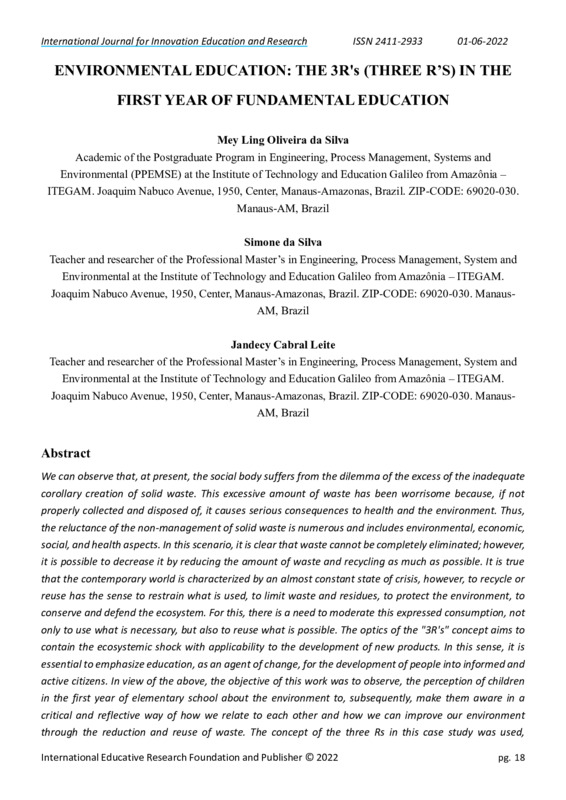-
Tipo do ITEM
-
Artigo Ciêntifico
-
Título do Artigo
-
ENVIRONMENTAL EDUCATION: THE 3R's (THREE R’S) IN THE FIRST YEAR OF FUNDAMENTAL EDUCATION
-
Descrição
-
We can observe that, at present, the social body suffers from the dilemma of the excess of the inadequate corollary creation of solid waste. This excessive amount of waste has been worrisome because, if not properly collected and disposed of, it causes serious consequences to health and the environment. Thus, the reluctance of the non-management of solid waste is numerous and includes environmental, economic, social, and health aspects. In this scenario, it is clear that waste cannot be completely eliminated; however, it is possible to decrease it by reducing the amount of waste and recycling as much as possible. It is true that the ontemporary world is characterized by an almost constant state of crisis, however, to recycle or reuse has the sense to restrain what is used, to limit waste and residues, to protect the environment, to conserve and defend the ecosystem. For this, there is a need to moderate this expressed consumption, not only to use what is necessary, but also to reuse what is possible. The optics of the "3R's" concept aims to contain the ecosystemic shock with applicability to the development of new products. In this sense, it is essential to emphasize education, as an agent of change, for the development of people into informed and active citizens. In view of the above, the objective of this work was to observe, the perception of children in the first year of elementary school about the environment to, subsequently, make them aware in a critical and reflective way of how we relate to each other and how we can improve our environment through the reduction and reuse of waste. The concept of the three Rs in this case study was used therefore, to clarify and promote reflection regarding excessive shopping, the reuse of what would go to waste such as cans, cardboard, bottles among others, and finally, to offer the possibility of converting items no longer used into other creations. This study contributed to the awareness and preservation of the environment and its didactic-pedagogical sequence promoted progression in the visuomotor, motor, motor, playful, affective, and critical-reflexive aspects, for the promotion of the acquisition and strengthening of competencies and skills.
-
Abstract
-
We can observe that, at present, the social body suffers from the dilemma of the excess of the inadequate corollary creation of solid waste. This excessive amount of waste has been worrisome because, if not properly collected and disposed of, it causes serious consequences to health and the environment. Thus, the reluctance of the non-management of solid waste is numerous and includes environmental, economic, social, and health aspects. In this scenario, it is clear that waste cannot be completely eliminated; however, it is possible to decrease it by reducing the amount of waste and recycling as much as possible. It is true that the ontemporary world is characterized by an almost constant state of crisis, however, to recycle or reuse has the sense to restrain what is used, to limit waste and residues, to protect the environment, to conserve and defend the ecosystem. For this, there is a need to moderate this expressed consumption, not only to use what is necessary, but also to reuse what is possible. The optics of the "3R's" concept aims to contain the ecosystemic shock with applicability to the development of new products. In this sense, it is essential to emphasize education, as an agent of change, for the development of people into informed and active citizens. In view of the above, the objective of this work was to observe, the perception of children in the first year of elementary school about the environment to, subsequently, make them aware in a critical and reflective way of how we relate to each other and how we can improve our environment through the reduction and reuse of waste. The concept of the three Rs in this case study was used therefore, to clarify and promote reflection regarding excessive shopping, the reuse of what would go to waste such as cans, cardboard, bottles among others, and finally, to offer the possibility of converting items no longer used into other creations. This study contributed to the awareness and preservation of the environment and its didactic-pedagogical sequence promoted progression in the visuomotor, motor, motor, playful, affective, and critical-reflexive aspects, for the promotion of the acquisition and strengthening of competencies and skills.
-
Língua do arquivo
-
inglês
-
Data da Publicação
-
Ano 2021
-
Palavra-chave
-
Elementary school
-
Environmental Education
-
Environment
-
3R'
-
Autores
-
Mey Ling Oliveira da Silva
-
Simone da Silva
-
Jandecy Cabral Leite
-
Local
-
ITEGAM - MANAUS, 2022
-
Áreas de Conhecimento
-
Energia e Meio Ambiente
-
Turma
-
Turma 01


